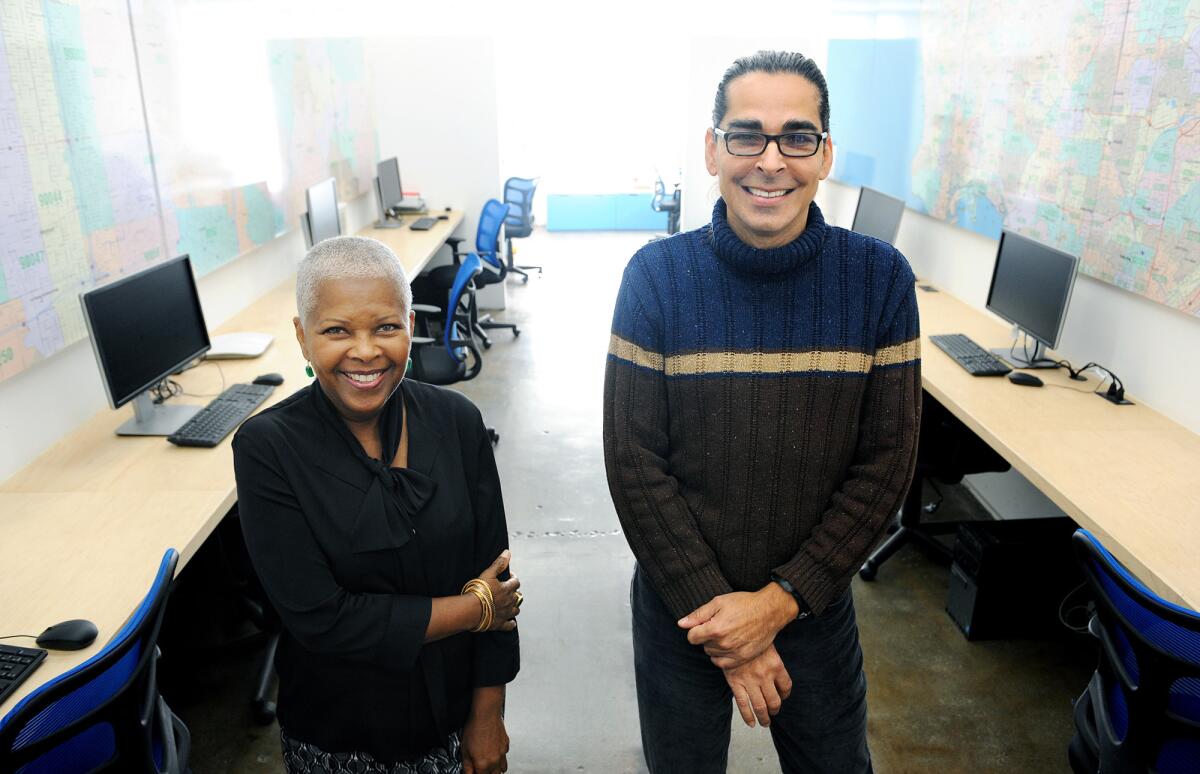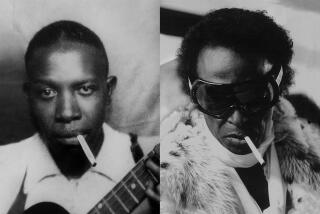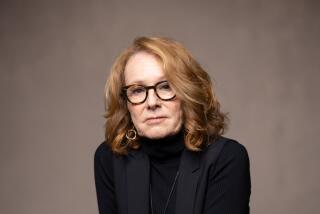Mark Bradford’s Art + Practice to bring art, social services to Leimert

The eastern side of Degnan Boulevard and West 43rd Place in Leimert Park at first glance seems like just another crestfallen Los Angeles block. Doors are closed. Gates are shut. Plywood obscures the windows on an ornate Art Deco-era structure topped by a stupa-like tower.
But walk closer and you’ll hear a hive of activity in storefronts along the block as workers sand, paint and debate where the light switches will go. A singular art and social services collaboration is being constructed.
Art + Practice, as this unusual project is called, will showcase museum-grade contemporary art exhibitions, while also offering services for youth in the city’s foster care system.
“This is the bookstore,” says Allan DiCastro, the organization’s interim director, as he walks through an empty Degnan Boulevard storefront being lined with wood panels. “We’re adding a second floor right there — that’s where the lectures will be. And we’re adding oak shelves. It will have a nice, warm feel.”
Behind him follows noted art collector and philanthropist Eileen Harris Norton, one of A+P’s founders, who on this brisk Friday afternoon stops to admire the day’s work. “It’s going to be an incredible space,” she says, as she takes it all in.
When it opens in February, A+P won’t be a typical community arts center. The Hammer Museum is providing curatorial muscle to stage exhibitions. The RightWay Foundation, which moved its headquarters in August to A+P, provides job training and mental health services to foster youth. And the bookstore is the venerable Eso Won Books, which will leave its Degnan Boulevard space for a storefront in the A+P complex.
Providing inspiration and guidance throughout is co-founder Mark Bradford, whose work has been shown at the Hammer, New York’s Whitney Museum and Boston’s Museum of Fine Arts. Bradford is also a 2009 recipient of a MacArthur Foundation fellowship.
“No one in L.A. County has a program like this,” says RightWay founder and director Franco Vega. “In fact, I don’t think anyone in the country has a program like this. There’s a program in Boston that mixes sports and mental health services, but not art.”
A+P is a result of the concerted efforts of Bradford, DiCastro and Norton, a close-knit, easygoing crew. DiCastro and Bradford have been a couple since the late 1990s. And Norton met Bradford in the early 2000s, just before the artist’s the historic 2001 exhibition “Freestyle” at the Studio Museum in Harlem.
“I was the first to buy from him,” she says. “He was a struggling artist. He’d finished CalArts but was still working at [his mother’s] hair salon. I had my hair done by him — back when I still had hair.”
A+P is a long-held dream for Bradford and DiCastro.
“For years, Mark and I have been talking about how we can do something that crosses volunteerism and art,” says DiCastro, who has a banking background and for nearly a decade helped run the Mid-City Neighborhood Council. “So much of what happens has to do with kids not having enough to do. So how can you change that?”
When the Art Deco building at Degnan and West 43rd Place went on the market a couple of years back. DiCastro says they found their place: Leimert Park, around the corner from where Bradford’s mother once operated her hair salon and where Bradford long maintained the studio where he began to produce the expressive, abstracted works for which he’d become known — works that, in their early days, contained the paper end wraps used in perms.
Once complete, the A+P campus will consist of half a dozen buildings housing not just the art gallery, bookstore and RightWay offices, but space for artist studios.
Bradford and DiCastro supplied a majority of the seed money to launch A+P, which has allowed the organization, a privately operated 501(c)3 foundation, to purchase some of the real estate it is occupying — including the graceful building at Degnan and West 43rd Place that will serve as the art gallery.
The project is also covered, in part, by a $600,000 grant from the James Irvine Foundation, as part of a Hammer initiative to create programming and increase arts access to residents of African American communities in South Los Angeles.
“Almost every department in our museum is engaged in the process,” says Hammer director Annie Philbin of her institution’s relationship with A+P. “Whether it’s administrative helping with a budget or public relations supporting them on marketing and publicity. The expectation is that we will support and guide them in not-for-profit practices, but it also brings the museum out beyond our four walls.”
Bradford, unavailable to join DiCastro and Norton on this day’s tour, adds in a short statement, “Annie has been a supporter of Art + Practice since the inception.” He also notes that it’s a natural collaboration with an institution that has shown his work for almost 15 years. (The museum also honored him at its annual gala in October.)
DiCastro and Norton took me on a tour of the in-progress spaces. The gallery that will be housed in the Art Deco building is still raw and un-primed, with wires and pipes poking out dangerously from an uneven cement floor. (They are awaiting permits from the city to begin construction.) But the social services offices — a couple of well-appointed storefronts on South Leimert Boulevard — are not only complete, they are already in use, boasting a tidy computer lab and a training center.
For DiCastro, one of the most crucial aspects of the project was getting the social service component just right. He and Bradford conducted extensive research on what sorts of services the neighborhood might need.
“In doing our research, we realized that in this ZIP Code, there is an epidemic of kids in foster care,” he says. “So it became important to us to focus our efforts there.”
In fact, L.A. County has the largest foster youth population in the nation (almost 30,000 kids), says RightWay’s Vega. A lot of that population resides in South Los Angeles. Dorsey High School and Crenshaw High School, both less than two miles from A+P, have the city’s highest concentrations of foster youth.
Vega, a former foster child himself, says that when he was approached by A+P, he was intrigued by the model — which not only has the potential to expose foster youth to art but the art world to the challenges faced by Los Angeles’ foster youth.
“I remember, [Mark] called me about a meeting,” he says with a chuckle, “and I was like, ‘Who is Mark Bradford?’ But we had the most relaxed conversation ever. He was asking me, ‘What do you want do do?’ ”
The next day Bradford approached him about meeting with the A+P board. Vega says the session went so well he not only decided to participate, he moved the RightWay Foundation’s headquarters to A+P’s Leimert Park campus. Since late summer, the organization has been providing life-preparedness classes for foster youth at its A+P location, which has a new computer lab. RightWay’s service include clinical counseling, resume building and job training. (The organization regularly places foster youth in jobs at places such as the Staples Center and USC’s Galen Center.)
“Everything they have promised us has come through,” Vega says. “And you couldn’t pick a better location. When the Metro is finished in 2019, you won’t be able to make it easier for youth than this.”
The bonus: RightWay gets two years’ free rent as part of the deal.
The Hammer’s Philbin says that the time and care that A+P has put into finding strong partners has been important to the museum, too.
“Mark and Allan are very serious and thoughtful,” she says. “They’ve done a lot of research on foster care issues and their approach is not springing out of nowhere.”
Equally important to all of this is Leimert’s Park history as a center of African American culture.
The neighborhood, home to Ella Fitzgerald, Ray Charles and other important African American figures, is where brothers Dale and Alonzo Davis ran the Brockman Gallery, L.A.’s first African American-owned commercial gallery. It was part of the community from the mid-1960s to the late 1980s. And for a time, Norton ran a space on Degnan Boulevard called Leimert Project. Last February, Papillion, a contemporary art gallery, opened its doors on the same block.
“I have a foundation, and the issues I’ve been concerned with are families in underserved communities,” says Norton. “But the art component is very important to me, too. This area has so much history. Brockman helped bring them all in. This helps keep the arts here.”
As part of its mission, A+P will provide studios to three artists in residence, terms that already began in August. Among the first artists to participate: Dale Brockman Davis, founder of the famed Brockman Gallery, who is using the space to work on his archive.
The public lecture space will be programmed in collaboration with the owners of Eso Won Books, James Fulgate and Thomas Hamilton. Since the 1980s, their bookshop has been a gathering place for African American authors and the community. (In 1995, the shop played host to a little-known activist by the name of Barack Obama, who was promoting his book “Dreams From My Father.”)
And, of course, there’s the exhibition program, which will include a wide range of shows managed by Hammer Museum curators. The first exhibition, opening Feb. 28 in A+P’s remodeled, two-room gallery space on South Leimert Boulevard, will showcase new work by L.A.-based conceptual artist Charles Gaines. This show will be in conjunction with a Hammer survey of early works, “Charles Gaines: Gridwork 1974-1989,” which goes on view at the Westwood museum on Feb. 7.
“It all fell right into place,” says Norton. “He’s local and he’s having a big show at the Hammer and he was very enthusiastic. It was an opportunity to show some new works.”
Among the new pieces at Gaines’ A+P show will be a 12-part series that combines a 1911 Manuel de Falla opera with a 1964 speech by Black Panthers activist Stokely Carmichael. Gaines will combine music and text to draw attention to class and race issues.
Subsequent A+P exhibitions will feature L.A. assemblagist John Outterbridge and mixed-media artist Njideka Akunyili Crosby.
Michelle Papillion, who operates Papillion gallery, couldn’t be more thrilled by A+P’s imminent debut.
“People want culture,” she says. “They want things that they can participate in and go to in their own neighborhood. And then go home with that information and continue to sort it out in conversation in their own circles.”
DiCastro’s hope is that A+P can honor the history of Leimert Park, while offering its residents fresh moments of discovery.
“The idea is to enhance what is already here,” he says. “Mark has spent so much time here. This is his way of giving back.”
Find me on Twitter @cmonstah.
More to Read
The biggest entertainment stories
Get our big stories about Hollywood, film, television, music, arts, culture and more right in your inbox as soon as they publish.
You may occasionally receive promotional content from the Los Angeles Times.











